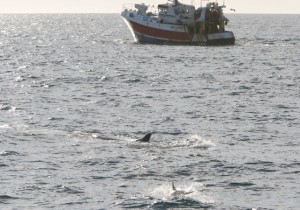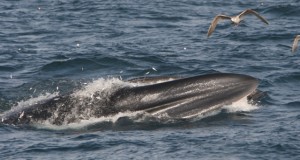
It is now mid-November, and true to the time of year, we have plenty of stormy, wet and disturbed Atlantic weather, making poor conditions for searching for and watching whales. There was just one day in the past month with perfect weather for whale watching, on November 5th, and a record number of minke whales (30+) were observed that day, in company with a large number of common dolphins under thousands of kittiwakes and gannets, all feeding on small sized whitebait. A pod of fin whales showed up briefly, but were not interested in such tiny prey, and moved on in search of larger bait fish.
It is at this time of year when, traditionally, large whale numbers peak, with dozens of fin whales, a handful of humpbacks, lots of minkes, and dolphins by the hundred being the norm. However, for the first time since I started whale watching in 2000, that is not happening, and for a very obvious reason. There are too few shoaling mature sprats available for the whales to feed on. These little silvery fish are, without doubt, the favourite prey of all the whales. It is no mystery either, that there are no sprats about; they were wiped out by the local mid-water trawlers last year, when they shoaled up to set about spawning. Every shoal was systematically removed as soon as they assembled.
I have not seen any mature sprat this year. The local West Cork stock must be close to extinction at present. Current fishing policy offers no protection for this species. The boats that pursue sprats are allowed to catch them in unlimited amounts, with no quota or total allowed catch in place, so they now appear to have caught all the stock.
In the 70’s and 80’s there were vast amounts of sprats about the place when very little fishing effort was directed at them. In the late eighties, at this time of year, there were shoals that could be measured in square kilometres. It wasn’t until the 90’s that fishing for them intensified, but even then the shoals could be measured in acres or hectares, rather than kilometres. Then, moving into this millennium, the fishery intensified further when the boats began using sophisticated sonar to locate sprats, such that no shoal went undetected as they did in pre-sonar seasons. Year by year, the sprat stock has been hounded by the pelagic trawlers; fish became measurable in square yards rather than acres, to the point we are at now, with no visible sign of any at all…. it is an environmental disaster.
The coastal and continental shelf waters around Ireland are considered rich and prolific by world standards. There is good reason for this. Irish waters contain vast blooms of phytoplankton every spring and summer. So vast are these blooms, they are clearly visible from images taken from space, and appear as enormous areas of milky looking water. These tiny plants rapidly give rise to massive amounts of zoo-plankton; tiny animals that feed on the phytoplankton. This is the beginnings of the ocean food chain. Into the picture now comes pelagic fish, such as sprats, sand-eels, herring and mackerel that take full advantage of all this zoo-plankton protein in the sea, and these species become prey themselves to many larger fish species of fish, plus a lot of oceanic birds, seals and cetaceans, right up to the largest of whales. Without a healthy population of these plankton feeding, pelagic fish, the entire ecology of the oceans would collapse. Sprats are a very important part of this system, and feed exclusively on plankton throughout their lives. Removing this species by heavy overfishing, (mostly to produce cheap fish meal) is unsustainable and suggests a lack of any meaningful fishery management.

Almost every species of fish that is taken commercially around our coastline, feed heavily on sprats throughout their lives. With little or no sprats about, all these fish will suffer accordingly. If there is a lack of suitable prey-fish many species will become cannibalistic in order to survive, leading to fewer fish reaching maturity. I have tried, in vain so far, to bring this situation to the attention of our Minister for Fisheries, and to highlight the need for action. At this point, it’s not about setting quotas, this fishery needs terminating in the hope that there are some sprat left to rebuild the stocks to their former glory. This is not just an Irish problem either, overfishing of forage fish, like sprats, is going on all around the planet, and unchecked will lead to less productive seas the world over.
There is now in place, for the past few years, a very worthy organisation called the Lenfest Forage Fish Task Force. It is a scientific body, rather than a political one, comprised of thirteen eminent scientists from around the world, with the objective of trying to advise those in control of sea fisheries management, of the dangers of over-fishing forage fish species, such as our sprats. Their excellent chairperson, Dr. Ellen Pikitch, came to Dublin to give a speech to a committee from the Department of Fisheries, about the dangers of over-exploiting our own forage fish species, but I fear her speech fell on deaf ears, as my own deliberations appear to have done. Humanity has very little to be proud of when it comes to marine conservation.
Colin Barnes
Cork Whale Watch





Hello Colin,
Long time no see and I hope you are well. I’m very sad to concur that you are absolutely correct in your observations and I thoroughly understand your disillusionment with the futility of engaging with Irish Politicians. Safe sailing & keep up the fight.
Gerard Burns (Keelbeg)
Hello Colin,
It is disappointing that Simon Coveney Minister for Fisheries ignores his responsibility to act to protect the marine environment by not setting up a Marine Protected Area for the sprats. I suggest you send a complaint and petition to Dg Environment and Dg Fisheries about the lack of protection afforded to these magnificent whales by the removal of their food supply. In 2000 following a complaint I made about blasting in Broadhaven Bay UCC was awarded a million euro contract to monitor cetaceans in Broadhaven Bay and the blasting plan was dropped.
regards,
Shay Fennelly
Hi Colin, would it be worth starting an on-line petition to send to the Minister. Social networking is so powerful these days it might have the desired effect ?